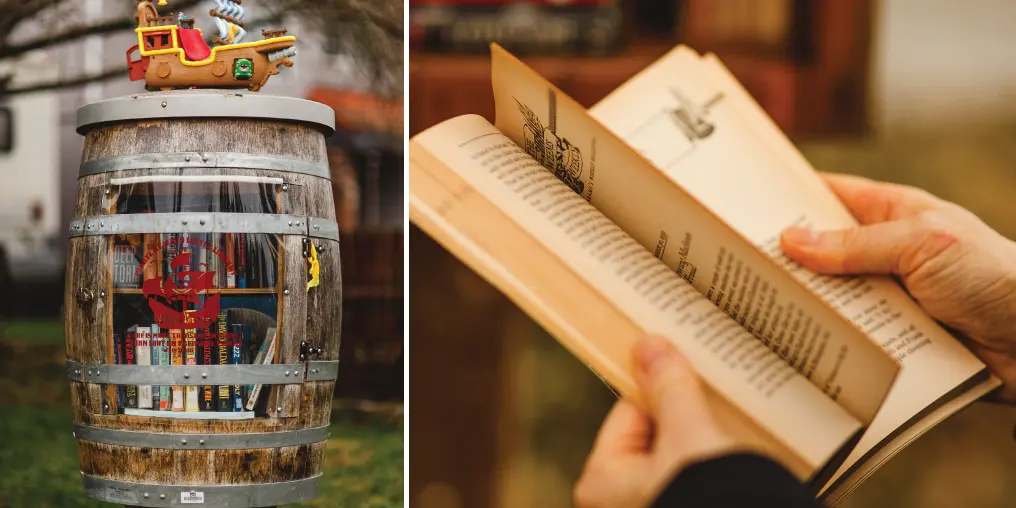A steady stream of people stops in front of a typical home in Courtenay’s Old Orchard neighbourhood. They come by bicycle, mobility scooter, car, or on foot. Some are pushing baby carriages; some are are walking dogs. They all share one purpose: they’re readers checking out the latest addition to the Little Free Library (LFL).
This scene occurs daily in dozens of Comox Valley neighbourhoods—and in 120 countries around the world (so far) where people have built Little Free Libraries as a way to reach out to neighbours and create community by sharing literature.
The origins of the first Little Free Library
A Wisconsin resident named Todd Bol set up the first LFL in 2009 to honour his mother, a teacher, who had taught him to love books. He and a friend then forged a goal of establishing 2,510 Little Free Libraries (to beat philanthropist Andrew Carnegie, who built 2,509 public libraries between 1886 and 1929). They reached this goal in 2012, and since then, their non-profit literacy organization has registered more than 150,000 LFLs around the world. Readers can find official LFLs on the organization’s online world map and app. But one does not need to register with LFL to build one’s own book exchange, and there are many unofficial (but just as beloved) lending libraries throughout the Valley.
Although there are no rules for the design of a Little Free Library, many people use one of the organization’s standard plans to create something substantial and solid. Most have peaked roofs and double-sided glass doors for ease of opening; many are brightly painted. People often build their libraries from recycled materials. Each design is unique, as is each collection: some libraries reflect their owners’ literary preferences and may even focus on specific genres.
How do Little Free Libraries work?
The concept is simple: people can take a book and/or leave a book (if they choose and are able). Nancy, a frequent Little Free Library user, drives around to find fiction. “You soon learn who keeps a genre and then you know others appreciate your donated books,” she says.
People have built Little Free Libraries as a way to reach out to neighbours and create community by sharing literature. When Laura, an East Courtenay resident, first saw a Little Free Library in Tofino, she thought it was a great idea, so her husband built one in their front garden. Their installation includes a bench, so folks can sit down while perusing the books. “People use the bench a lot, especially families with children,” she says.

During the pandemic, many people began reading more. Laura notes, “My Little Library was very busy with the closure of the public libraries. The books flew out of the library as soon as they arrived.”
Laura’s library is a lively part of her neighbourhood. One man brings his grandchildren to check out the collection while they sit together on the bench. Other folks drop by and donate books on their walks around the community.
Laura inspects her LFL’s books regularly to ensure they are in good condition and curates her shelves to maintain a variety of fiction, non-fiction, and children’s books. When books have been in the library for several months, she finds new homes for them.
Bill, an avid reader from Comox, first heard about Little Free Libraries from a talk show. Soon after, he registered with the organization, used one of their plans to build his structure, and installed it on his front lawn. Bill says, “I am always giving books to friends and family,” and his LFL has given him another means of sharing his love of literature, along with the blog he started, which includes updates and brief reviews of books in his library. He likes getting thank-you notes, which let him know that book lovers appreciate his efforts.
The printed word is alive and well
The invention of e-books, like the invention of audiobooks before them, caused some literary experts to predict the end of physical books. And yet, in 2023, publishers sold 767.36 million books in the US, while Canadians bought 48.8 million books.
This figure probably does not reflect books sold privately by self-published authors. The printed word is clearly alive and flourishing, and Little Free Libraries are part of that phenomenon.
When we reach into a Little Free Library, we enter a world beyond the printed page. Our favourite libraries allow us to discover the latest additions from like-minded people. And for those last moments of the evening, when we prepare to end our day, nothing compares to the comfort of a book on our chest as we fall asleep.





